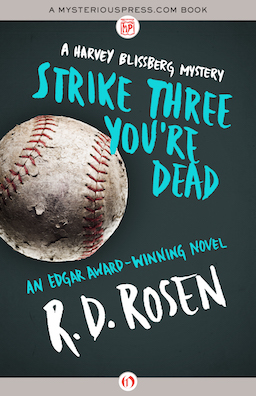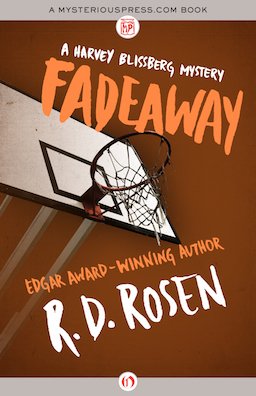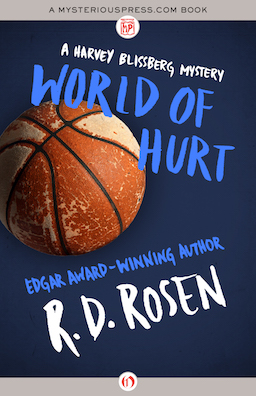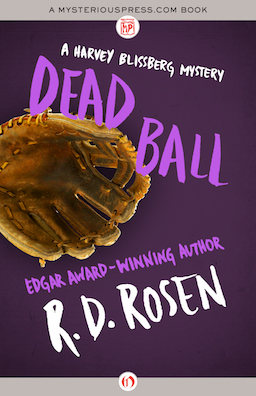
Winner of the 1985 Edgar Allan Poe Award
for Best First Novel
This was my first stab at writing a mystery. When it won the Edgar, I felt like one of those rare major leaguers who homers in his first at-bat. In reality, it was a rough road. My agent at the time (a charmless woman who would become one of the most powerful agents in the business) had struck out with 10 or 12 publishers, then told me to put the manuscript in a drawer and move on. I declined, telling her to send it to Walker & Company, which bought it. When it was nominated for an Edgar, I was miffed when my agent didn’t bother to call to congratulate me. When I won and she didn’t bother to call, I fired her by letter. You can bet I heard from her then. She screamed at me on the phone for a couple of minutes; “What makes you think you can fuck with me and [agency name here]!” is the part of her tirade that’s stayed with me. By the time Strike Three You’re Dead (thank you, Betsy Meyer, for that title) was later named one of “the century’s 100 favorite mysteries” by the Independent Mystery Booksellers Association, Harvey Blissberg had appeared in four more mysteries.
Here’s the gist of it in a few sentences:
The Providence Jewels, an American League-expansion team, have been taking a beating all season. Worse, relief pitcher Rudy Furth has just taken a mortal beating—and been left to die in the clubhouse whirlpool among whispers of mob corruption and violently lovesick groupies.
When the police investigation stalls, veteran Providence centerfielder Harvey Blissberg, who knew Rudy as well as anyone, decides to play detective as well. While trying to keep his average above .300 and his head above water with spunky local sports reporter Mickey Slavin, Harvey quietly stalks Rudy’s killer through major league locker rooms and the dark streets of Rhode Island’s capital city.
(Click on cover to purchase)
EXCERPT
Last year, with the Red Sox, Harvey Blissberg had considered himself in his prime. Now he felt like someone detained at the border before being allowed to pass over into the rest of his life.
Providence, Rhode Island, looked like a place you ended up when they kicked you out of everywhere else. It was too small and not nervous enough to be a city, as Harvey understood the term, but it was too big to be anything else. It seemed to consist entirely of outskirts.

By Fadeaway, my second mystery, Harvey had retired from baseball to become a full-time investigator and I had become a better mystery writer. I don’t mean any disrespect for Edgar Allan Poe and his namesake statuette, but I’ve always thought that Fadeaway’s characters are richer, the plot more complex, and I was able to make more evocative use of Providence, which before its renaissance struck me as America’s perfect, neglected film-noir metropolis.
Here’s a very brief synopsis:
Retired from baseball, Harvey Blissberg has hung out a shingle in Cambridge, Massachusetts, as a private investigator with a taste for the less savory side of sports. When key players from the Boston Celtics and the Washington Bullets go AWOL, Harvey quickly becomes the two teams’ number one draft choice to figure out why.
What can a recently born-again black forward and a white point guard whose nickname is “Toot ‘n’ Shoot” have in common? When the two missing NBA stars turn up dead, Harvey searches desperately for the link between them. The hunt leads him back to the city he thought he’d seen the last of for a while—Providence, Rhode Island—and an unholy deal struck years before between two of the city’s most powerful figures.
(Click on cover to purchase)
EXCERPT
Harvey unscrewed the cap on the blue jar of Vicks VapoRub, dipped his pinky into the jelly, and anointed each nostril. The vapors rose rapidly into his brain; Harvey could not imagine that a bigger kick was to be had from cocaine.
From the office’s lone window, he caught a sliver of Mt. Auburn Street. Harvard Square was slushy with undergraduates. Congestion, he thought, was the better part of Harvard Square’s squalor.

In 1985, after years of enviously eyeing Manhattan as the logical alternative to the preciosity of Cambridge, I was offered a job there I couldn’t refuse: writing for “Saturday Night Live.” After a few distressing months in the show’s weird sado-masochistic environment, I repaired to my one-bedroom apartment to write my third mystery. Not surprisingly, the plot brought Harvey down from Cambridge for an assignment that forced him to mingle with the neurotic subspecies of humans who are funny for money. A final note: Many years later, Showtime came oh-so-close to making a TV movie of Saturday Night Dead, from a screenplay I wrote.
The brief plot summary:
When Harvey Blissberg is hired by Roy Ganz, the pretentious, pint-size producer of a legendary but fading late-night network comedy show, to find that week’s missing guest host, he has no idea that he’s about to walk right into a television tragedy. No sooner does Harvey have the AWOL host back where he belongs than producer Ganz exits a twenty-fourth floor window, falling faster than his show’s ratings.
Hastily hired by the network to conduct a discreet investigation, Harvey slowly makes his way through the show’s ragtag roster of writers and actors, no small number of whom had reason to defenestrate their boss. The joke’s on Harvey, however, when his investigation forces him to make an unexpected detour to the early days of television.
(Click on cover to purchase)
EXCERPT
The hotel phone rang him out of a deep sleep.
“Harvey?” the voice said. “This is Leo. Leo Rhoades.”
“You looking for Kasick?” Harvey heard himself say. He had been dreaming that he was look for Kasick again, that he was forced to devote the rest of his life to finding Kasick.
“I’m not looking for anybody,” Leo said. “We found somebody. We found Roy.”
“Roy Ganz.”
“Yeah, we found Roy Ganz in the alley here.”
“Oh, yeah?” Harvey stifled another yawn. “What was Ganz doing in the alley?”
“Completing a fall.”

My fourth mystery pays homage to some elements that hadn’t played much of a role yet in my books, although they were certainly influences in my life: my childhood in the suburbs of Chicago, the fathomless complexities of intimate relationships, and psychological abuse. For World of Hurt, I blended these and other themes into a very dark tale in which Harvey himself strays off the beaten path.
In a nutshell:
After Harvey Blissberg’s beloved older brother beckons him to Chicago to find his missing pick-up basketball pal, Larry Peplow, a favor for a sibling turns into a bitter tale of real estate, bad taste, and sexual abuse. World of Hurt is set in the suburbs of Chicago, on the coast of Maine, and in some places not found on any map.
While struggling with his own fears of marriage and mortality, Harvey soon finds himself up to his neck in overheated housewives, predatory parents, toxic psychotherapists, and the seamier side of a sleepy suburb. By the time he’s untangled the mess that left a man dead in an upscale residential development, Harvey finds himself right back at the scene of the crime with a Colt. 45 now aimed at his own head.
(Click on cover to purchase)
EXCERPT
Looking down at the top of her head, Harvey had the fantasy of getting out of the car, leaving the relevant part of him behind for her continued use.
She had a gift for it. He wondered whether, like the child violin prodigy or the twelve-year-old with a preternatural curveball, she had sensed her destiny early in life. Since practice made perfect, Harvey imagined himself at the end of a long line of beneficiaries of her art. There was nothing cheap about what was going on, just sudden and whimsical. Two adults ducking out in the alleyway behind the theater of their lives for a hot taste of common humanity.

The germ of the plot for Dead Ball was a horrifying exhibit at the New York Historical Society in the late 1990s of black-and-white photographs of lynchings. Just as frightening as the images of racist brutality were the self-satisfied faces of white onlookers, some of whom smiled for the camera while the mutilated victims dangled from tree branches in the background. Out of those disturbing pictures, and the notion of a contemporary black baseball player closing in on Joe DiMaggio’s “unbreakable” record hitting streak in 1941, I fashioned a story of modern-day racism that would reunite Harvey with his old team and reacquaint him with the underside of the national pastime.
Here’s a synopsis:
Fifteen years after retiring from baseball, Harvey Blissberg is suffering a bad case of what his girl friend Mickey Slavin calls “sad man-ism” when the owner of his former team, the Providence Jewels, tracks him down. The team’s star Moss Cooley, on the verge of breaking Joe DiMaggio’s “unbreakable” 56-game hitting streak, has been the target of racist threats—the latest one taking the form of a decapitated Negro lawn jockey. Would Harvey mind playing bodyguard for a while?
However, when Cooley’s streak ends shy of DiMaggio’s record, the threats continue, suggesting that there’s more at stake than preserving a white man’s supreme achievement. Blissberg feels he has no choice now but to follow the trail of clues back into the past, where recently discovered photographs of a Southern lynching point him to the case’s bloody resolution.
(Click on cover to purchase)
EXCERPT
Harvey Blissberg seemed to be walking a plank of his own making. He had been out of baseball for fifteen years and out of sorts for the last six months. After ten years spent as a private investigator followed by four forgettable ones as a motivational speaker, Harvey felt he was slowly marching himself at cutlass-point toward an early demise.
When the phone rang, he paused a documentary called When It Was a Game that he was enjoying for the third time that week, brushed the tortilla chip crumbs off his shorts, and croaked a hello into the receiver.
“Professor?” a voice said. “That you?”
Professor. No one had called him that for years. It was like hearing a childhood nickname called out at the end of a very long hallway.





